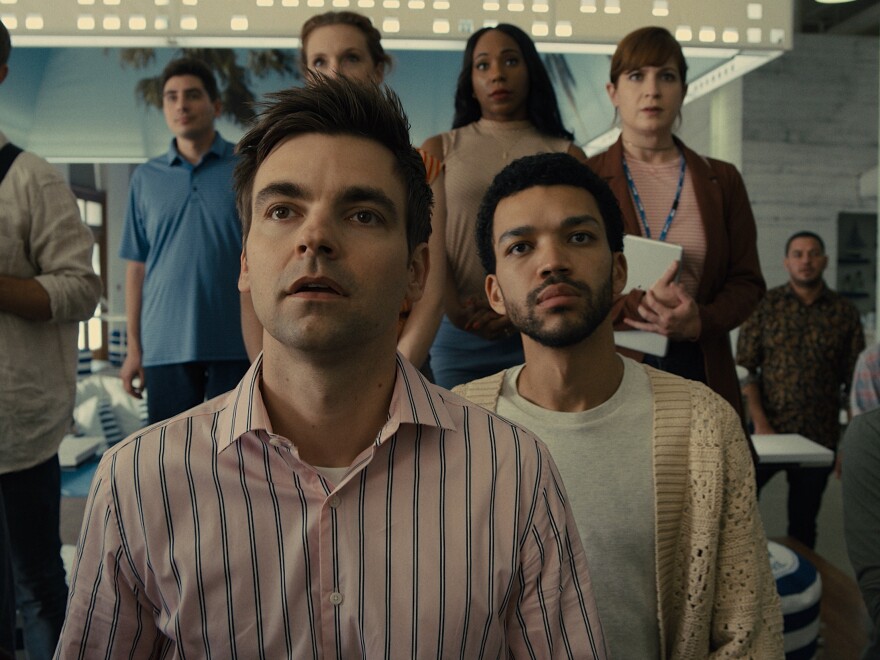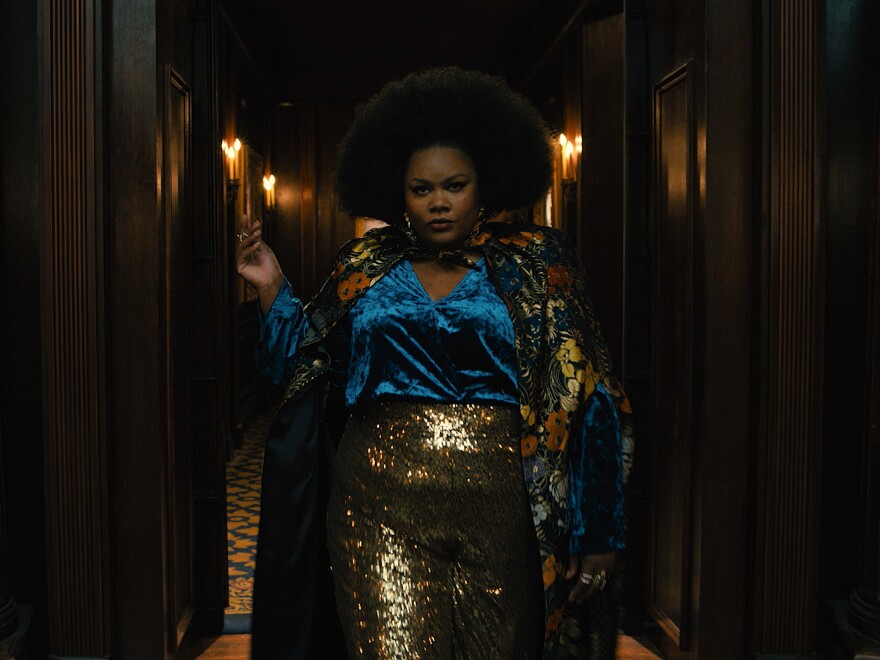Lately, I've been musing on the concept of time and its relationship to Black art and identity. I keep bumping into this question: What time do we all think we're living in right now?
In the year of someone's lord 2024, a recent episode of Feud: Capote vs. The Swans conjured up James Baldwin – the same James Baldwin who once wrote, "I don't like people who like me because I'm a Negro; neither do I like people who find in the same accident grounds for contempt" – as a Magical Negro to Truman Capote.
A straight-faced excavation of this old Hollywood trope, which has been on the wane for some time, is startling enough. But now there's also Kobi Libii's feature debut, The American Society of Magical Negroes, which attempts to skewer it. The comedy writer and performer imagines an underground network of Black mystics who dedicate their lives to placating white people for the safety of Black people everywhere. "White discomfort," as one character opines, is the "nemesis" of Black existence.
If this all sounds like the premise for a classic Key & Peele sketch, you wouldn't be too far off. The trouble is, as far as I can tell, no one involved with writing Key & Peele had anything to do with the Society of Magical Negroes.
The movie has at least two crucial factors working against it. For one, the Magical Negro trope isn't anywhere near as pervasive in Hollywood as it was when Spike Lee coined the term more than two decades ago. So despite being set in the present day, Libii's social commentary brings with it no new enlightenment on the dominant stereotypes Black people face now, despite a nearly two-hour runtime.
Second, it has no Black characters. To be clear, there are real Black performers playing these roles on screen. But one would think fully human, complexly written roles ought to exist in a movie where the goal is combatting multiple centuries' worth of one-dimensional representation. Here, they decidedly do not.
The Illuminati, but make it respectable
In Society of Magical Negroes, Justice Smith plays Aren, a dull and depressing L.A. artist whose specialty is dull and depressing abstract yarn installations. His latest work is on display at an art show, but no one "gets" it. When a white collector mistakes him for the waitstaff, Aren obliges and gets the man a drink instead of trying to convince him to buy his art.
A member of the actual waitstaff has been observing him all night and introduces himself. It turns out he's Roger (David Alan Grier), a jolly older man who's arrived to recruit Aren into the American Society of Magical Negroes, a "firm" that views itself as a group of world-class superheroes. He leads him to their secret headquarters, tucked away behind a Black barbershop, with hallowed rooms and halls that resemble Hogwarts or the Clue mansion. The visual world-building in this regard is the film's sole inspired choice.

Each Society member is assigned a white "client" who's experiencing some sort of crisis and is dangerously close to taking out their anxieties on innocent Black people. (A "white tears meter" assists in monitoring the threat level at any given moment.) The Magical Negro's job is to befriend and counsel their client through all their issues until they get whatever it is they want. Aren's first guinea pig is Jason (Drew Tarver), a disgruntled, egotistical tech bro at a software company called MeetBox, who's angling for a promotion he almost certainly doesn't deserve. Aren is hired at MeetBox and immediately gets to work practicing his skill of being a personality-less doormat, which has a great effect on clueless Jason.
Did I mention this is also a workplace rom-com? Sure, why not? Aren discovers one of his other new colleagues is Lizzie (An-Li Bogan), a woman with whom he had the gawkiest and most unsexy of meet-cutes at a coffee shop earlier in the day. Lizzie happens to be Jason's "work-wife," but he's also into her, so that complicates Aren's adherence to his Magical Negro responsibilities and tests his commitment to The Cause.
Maybe we're all just Magical Negroes
So many disparate ideas and tones are being mashed up here, and none of them gel. Libii spends a ton of time obsessing over the details and internal rules of these proud, respectability politicians. Yet he also has a slippery grasp on the trope he seeks to interrogate. In this world, the Magical Negro is broadened out from its very specific real-world definition – Spike Lee was referring to movies with "magical, mystical" Black characters in films like The Legend of Bagger Vance and The Green Mile – to an all-encompassing label that includes any Black person who's ever merely decided "Not today, Satan" and resisted the bait when dealing with racial microaggressions at work and Crispus Attucks.
Those muddled conflations would be less jarring if Aren were written as anything other than a convenient vessel for showcasing a convoluted premise. We know nothing about him besides that he's a failed, self-loathing Rhode Island School of Design alum who's so spineless he'll awkwardly hold the door for a parade of oblivious exiting passersby before finally entering a coffee shop for himself. Before becoming a Magical Negro (I can't believe this is an actual sentence I'm writing), he has no community to speak of – no friends, no real job, and no family, except a white mom he offhandedly mentions. (This is somehow both very illuminating and not at all illuminating at the same time.) Where did he grow up? How can Aren afford to be a struggling artist with a decent apartment in Los Angeles in this economy? Has Aren ever spent any time with Black people? (Magical Negroes don't count.)

His character arc, if you wish to call it that, concludes with him superficially liberated. In the film's climax, he gives a grandstanding speech that's What It's Like to Be Black 101, a far more grating version of Barbie's climactic Feminism 101 monologue. The moment is wholly unearned, and the epiphany lands with a thud because Aren didn't really start from any place real to begin with. There's nothing radical or daring about his journey to self-discovery, which hinges almost entirely on his romantic pining for Lizzie. In fact, Libii's script doesn't even try to engage with Black radicalism because if it did, The Society would have to come under far more rigorous scrutiny than the film is interested in pursuing. The Magical Negroes, so proud to have single-handedly "raised the Black life expectancy," at least according to society head Dede (Nicole Byer), exist in a world where the likes of Harriet Tubman, Marcus Garvey, the Black Panthers, and Bree Newsome never existed. The movie's finale seems content with that omission.
What time are we living in now?

So: What time are we living in now? It depends on who you ask and where you look. Not unlike American Fiction, Society of Magical Negroes is convinced Black people on screen and in real life are, by and large, contending with the same stereotypes and barriers that we were 20 years ago. But that's its own kind of retrograde nostalgia trap to fall into, the kind that can only be constructed by ignoring key parts of history and the present reality.
There are pressing issues like pay inequities and Black-created TV shows being canceled far too soon. But there's also been so much exciting work being made by filmmakers on every level over the last decade – emerging voices like Nikyatu Jusu, Raven Jackson and Juel Taylor; newly-minted titans like Issa Rae and Jordan Peele; established vets like Gina Prince-Bythewood. They've told stories spanning a breadth of genres, sensibilities and character studies, the stuff their predecessors dreamed of. Amid this landscape, it's hard not to view the Magical Negro as – thankfully – a relic.
Writing more than 25 years ago, bell hooks lamented how a dominant white supremacist environment forced too many Black artists to be hyperfocused on producing "resisting images," thus overwhelming their creative and upsetting artistic integrity. At the time, she observed that Black filmmaking was still a "fertile frontier" because of the lack of radical images, but that she foresaw a "far distant future" where Blackness will be "overworked, overdone" just as whiteness has been. We're a little bit closer to that future than we've ever been. But evidently, we've still got some ways to go.
Copyright 2024 NPR. To see more, visit https://www.npr.org.




